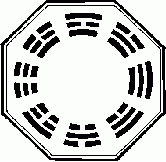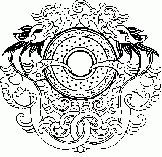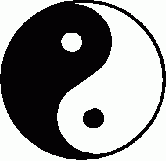|
What is Geomancy?
Geomancy is a very practical, pragmatic, and philosophical view of manipulating {as much as one can manipulate} both current and future events. Geomancy can be I Ching {pronounced Yee Jing}, Feng Shui {pronounced Fung Shway}, Chinese astrology, and Chinese numerology. Also, to some extent, geomancy plays a part in Chinese herbalism, acupuncture, and the martial arts {including Tai Chi and Qi Dong}. Geomancy is considered both an art and a science.
Practitioners of geomancy study for years and years under very strict training and practitional guidelines in order to become experts/masters. In my opinion, geomancers are the best self-regulated professionals on this planet. Unlike much of the New Age and Geomancy crazes here in North America, which promise things like Feng Shui certification after a weekend workshop - training in China and the Orient takes years and years. So, if you're thinking of becoming a witch "quickly" and "instantly", please think again. Whether Geomancy or witchcraft, you have years of study and practice ahead of you - sorry, no "fast food" solutions, here.
Geomancy, I believe, is China's {or the Orient's} answer to spellcrafting and divination. EXCEPT that the Chinese look upon geomancy AS NOT steeped in medieval European superstition and religious hysteria. {So, thank you, to China and all the other countries in the Orient that practice geomancy in a normal, everyday, and common sense manner.}
I Ching
"The Book of Change is the most ancient and most profound of the Chinese classics, venerated for millennia as an oracle of fortune, a guide to success, and a dispensary of wisdom. The ancestor of all Chinese philosophy, it is the primary source for the pragmatic mysticism of the Tao Te Ching, the rational humanism of Confucius, and the analytic strategy of Sun Tzu's Art of War."
I Ching, The Book of Change, Thomas Cleary 1992
I Ching is an ancient Chinese oracle that provides an Oriental philosophical perspective to give insight on situations and problems. One poses a question - whether general or specific - though it is advised that the question should be as specific as possible. In other words, I Ching is divination.
I Ching is considered to be either 5000 to 6000 years old and is very likely the oldest book in existence. However, the form of I Ching used today was not fully developed until Confucius' time about 2300 years ago. The I Ching is considered a mix of both Taoist and Confucian philosophy. "I" means change. "Ching" means book. Therefore I Ching means the 'Book of Change'. {Note: Some researchers call it the Book of Changes.}
Once the question is asked, then a hexagram is determined - of which there are sixty-four. Each hexagram represents either a piece of advice or an astute opinion.
{And, believe me, it's not always what you want to hear. I Ching can be kind but most times it can be quite pointed. I Ching is a lesson in humility and common sense. Personally, I recommend I Ching to anyone seeking a divination. It often adds that last little bit of icing to the cake - to help make a divination "down-to-earth" - to emphasize the "best advice" part of the divination.}
What is a hexagram? What is a trigram?
A hexagram - besides being a SIX sided figure - is a figure made up of six lines. Each line is either a solid line {yang - masculine} or a broken line {yin - feminine}. And, each set of three lines is known as a trigram - so, in I Ching, a hexagram is a PAIR of trigrams. There are only eight I Ching trigrams - in turn making up the 64 hexagram combinations. {Click here for details and meanings.}
"The eight trigrams determine fortune and misfortune." Confucius
�
|
|


